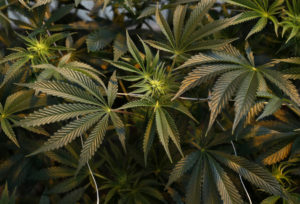University to test if chemical in pot aids kids with autism

UC San Diego will try to alleviate severe autism in children by giving them a nonpsychoactive chemical found in marijuana, a project funded by the biggest private donation ever made in the U.S. for such research.
The $4.7 million study involves the controversial compound cannabidiol, or CBD, which is widely marketed nationwide as something of a miracle drug, capable of treating everything from cancer to post-traumatic stress disorder.
Regulators believe CBD does show therapeutic promise. But they also say the miracle drug claims are wrong or based on anecdotes rather than scientific evidence. Last fall, the FDA warned four companies to stop saying things like, “CBD makes cancer cells commit ‘suicide.’ ”
UC San Diego dealt with the issue by asking the Ray and Tye Noorda Foundation of Lindon, Utah, for $4.7 million to study whether CBD can ease the most severe symptoms of autism, including seizures, self-injuring behavior, and crippling anxiety.
The foundation agreed, and it is urging the federal government to remove marijuana from its list of Schedule I drugs so that cannabis can be widely studied.
Schedule I drugs are defined as substances and chemicals that have no accepted use in medicine and a high potential for abuse. As a result, the government provides little money to study marijuana.
The listing contradicts the findings of many federal, industry and university scientists who say cannabis appears to be helpful for treating a variety of diseases and disorders, including epilepsy, chronic pain, and the vomiting associated with chemotherapy.
Parents are pressing scientists to expand their research to autism spectrum disorder, a developmental brain disorder that afflicts 3.5 million people in the U.S. Some parents have given CBD to their autistic children, notably in states like California where medical and recreational marijuana are legal.
“I’ve spoken to parents who swear that this is effective — but it needs to undergo scientific research,” said Scott Badesch, president of the Autism Society of America, which is based in Bethesda, Md.
UC San Diego’s Center for Medicinal Cannabis Research will conduct a clinical trial involving 30 autistic children with severe symptoms. The children, who will be recruited from throughout the region, will be given a liquid form of CBD that will be provided by a federally approved laboratory in Arizona.
During the study, which begins next year, the children will also undergo behavioral testing, MRI scans and electroencephalograms. The patients will range in age from 8 to 12.
“It’s important to do this study to show whether there is objective improvement, or whether (CBD) is detrimental or whether it doesn’t do anything at all,” said Dr. Doris Trauner, the UC San Diego pediatrics and neuroscience expert who will lead this aspect of the study.
Determine safety
The university says the overall project, led by Dr. Igor Grant, “will determine if CBD is safe and tolerable and whether it alleviates adverse symptoms of ASD; determine whether and how CBD alters brain activity, neurotransmitters and/or brain network connectivity; and determine whether biomarkers or neuroinflammation are altered by CBD.”
The $4.7 million that the Noorda Foundation is giving for the study represents the latest effort by the group to promote public health and welfare. Noorda has donated money for everything from higher education to youth services to hospitals.
Noorda is partnering on its support to UC San Diego with the Wholistic Research and Education Foundation, a La Jolla-based group that promotes research and education about medical marijuana, particularly CBD.
The foundation is run by Andy Noorda and Pelin Thorogood, who said in a joint email to the Union-Tribune that, “CBD has its controversies as there are companies that make unproven health claims, and their products may not even contain the ingredients or concentrations they advertise.
“The federal designation of cannabis as a Schedule I drug is one of the primary enablers of this problem. Unlike other substances whose use may increase risk or lead to abuse, such as alcohol or tobacco, currently there are no set standards for manufactures. Nor are there clear guidelines for the public as they make choices regarding if, when, and how to use cannabis safely for therapeutic purposes.
“Our goal is to change this paradigm with research-driven, scientific data, while also supporting the establishment of standardized testing and regulation to ensure that available products are indeed what they claim to be.”
